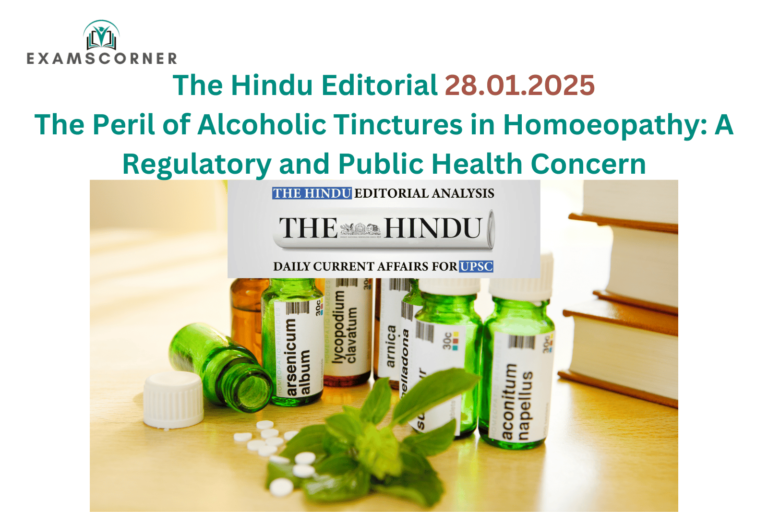Introduction
A recent Supreme Court judgment in Bhagwati Medical Hall vs Central Drugs Standard Control Organization & Ors. has once again highlighted the significant challenge faced by Indian state governments in regulating the sale and misuse of alcoholic tinctures marketed as homoeopathic remedies. Despite attempts by the Union Government to address this public health hazard, the formidable homoeopathic industry’s legal maneuvers have consistently thwarted regulatory efforts. In this article we were seen about The Peril of Alcoholic Tinctures in Homoeopathy: A Regulatory and Public Health Concern.
The Regulatory Maze Surrounding Alcoholic Tinctures
Alcoholic tinctures, liquid extracts of herbs dissolved in alcohol, fall into a regulatory grey area due to India’s complex constitutional framework. Here’s how this framework complicates regulation:
- Public Health and Taxation: Public health and alcohol taxation are state subjects under Schedule VII of the Constitution. However, alcohol for medicinal purposes falls under Union jurisdiction, per Entry 84 of List I, allowing the Centre to decide taxation rates.
- Taxation Anomalies: Before the GST era, alcohol for medicinal use was taxed at a mere 4% under the now-repealed Medicinal and Toilet Preparations (Excise Duties) Act, 1955. Post-GST, the Union has set an 18% tax rate for medicinal alcohol, still significantly lower than state taxes on alcoholic beverages.
- Concurrent Jurisdiction on Drugs: Drugs fall under the Concurrent List, allowing both Union and states to legislate. However, state amendments to the Union’s Drugs and Cosmetics Act, 1940, require presidential approval, creating additional hurdles for state-specific regulations.
This regulatory complexity has allowed manufacturers of homoeopathic alcoholic tinctures to avoid quality control and taxation by states, even though these products directly impact public health. As a result, these tinctures, often containing 12% alcohol by volume (compared to 7% in strong beers), are cheaper and easily accessible substitutes for alcoholic beverages.
Public Health and Revenue Loss
For states, the sale of homoeopathic alcoholic tinctures is a double-edged sword. On one hand, it causes revenue loss as these products evade higher state taxes imposed on alcoholic beverages. On the other hand, they pose a serious public health risk:
- Alcohol Abuse: Many consumers, particularly those seeking inexpensive alcohol, misuse these tinctures for intoxication. In states like Gujarat and Bihar, where alcohol prohibition exists, these tinctures have led to multiple cases of alcohol-related deaths.
- Health Hazards: Unsuspecting consumers often use these tinctures as remedies without realizing their high alcohol content. Prolonged consumption can lead to severe illnesses such as alcoholic hepatitis, even in individuals with no prior health issues.
Industry Resistance and Legal Battles
Recognizing these risks, the Union Government introduced Rule 106B to the Drugs and Cosmetics Rules, 1945, in 1994. This rule limited alcoholic tinctures to a maximum of 12% alcohol by volume in 30 ml bottles, with larger 100 ml bottles restricted to hospitals. However, the homoeopathy industry launched aggressive legal campaigns against this rule, arguing it violated their fundamental right to trade and lacked statutory backing.
- First Round of Litigation: The rule’s validity was challenged in multiple High Courts, delaying its implementation until 2014, when the Supreme Court upheld it.
- Second Round of Litigation: In 2015, the industry filed 13 lawsuits claiming Rule 106B was invalid as it hadn’t been laid before Parliament for 30 days, as required under Section 38 of the Drugs and Cosmetics Act. Despite the Union’s option to rectify this by presenting the rule to Parliament, it instead pursued further litigation, resulting in delays that have rendered the regulation unenforced.
The Way Forward
India’s bureaucratic and legal delays have exacerbated the public health crisis posed by alcoholic tinctures. While the judiciary’s involvement is essential, legislative clarity and proactive governance are critical. Key steps include:
- Harmonizing Regulation: The Union Government must streamline regulatory mechanisms, ensuring states have the authority to regulate and tax alcoholic tinctures based on public health needs.
- Strict Enforcement of Rule 106B: Immediate parliamentary approval of Rule 106B is necessary to invalidate ongoing legal challenges.
- Public Awareness Campaigns: Educating citizens about the risks of consuming alcoholic tinctures under the guise of homoeopathic remedies can prevent misuse.
- Reconsideration of Alcohol Use in Medicine: With global discussions around mandatory cancer warnings for alcoholic beverages, India must evaluate whether alcohol use in medicinal and ayurvedic products should continue, especially given the potential harm to uninformed consumers.
Conclusion
The unchecked sale and misuse of alcoholic tinctures (Peril of Alcoholic Tinctures in Homoeopathy) marketed as homoeopathic remedies represent a significant threat to public health and state revenue. While legal and bureaucratic hurdles persist, decisive action by the Union Government and increased awareness among citizens are essential to mitigate this hazard. Addressing this issue effectively will require collaboration across governments, healthcare professionals, and the legal system to prioritize public welfare over industry interests.



